UPDATED, July 21, 9:55 a.m.: Jeffrey Soffer’s iconic Fontainebleau Miami Beach was among the first of the city’s hotels to reopen on June 1, after the majority were shut down for the entire month of May.
The sponsors of the 1,500-room oceanfront resort — whose hallways have been graced by Elvis Presley, Lucille Ball, and more recently, Jennifer Lopez and Kim Kardashian West — spent hundreds of thousands of dollars on the reopening.

Jeffrey Soffer, CEO of Fontainebleau Development
Preparations included the purchase of electrostatic sprayers, thermometers and hand sanitizer dispensers throughout the property, as well as training employees in the latest health and safety protocols. And as it prepared to reopen its doors, the luxury hotel planned to hire 500 employees back in the first couple weeks, adding more as occupancy returned.
“We’re cautiously optimistic that people are making reservations,” Philip Goldfarb, president and CEO of the hospitality division of Soffer’s Fontainebleau Development, said at the time.
But of the more than 2,000 employees who were temporarily laid off due to the pandemic, the Fontainebleau ended up bringing back just 774 by July. About 1,300 workers were recently provided with a separation notice, according to a Worker Adjustment and Retraining Notification that cited the effects of ongoing restrictions on travel and large gatherings, as well as the hotel’s low occupancy.
At the same time, a $975 million CMBS loan backing the resort is stuck in special servicing, a situation the hotel’s owners say occured because they are seeking modifications to the loan.
The Fontainebleau is not alone.
No hotel can operate on less than 20 percent occupancy. The numbers don’t work.
After Florida began to lift its stay-at-home orders, positive cases of Covid-19 skyrocketed. As of July 13, following a daily record for the U.S. with 15,300 cases reported in 24 hours, there have been more than 282,000 cases and 4,277 deaths documented in the state.
That, coupled with closures of the beaches and countywide curfews, led to already low occupancy rates taking another hit. Many hotels — banking on being sold out for the 4th of July weekend — ended up with significant cancellations.
The start-and-stop of the market spells trouble for South Florida’s hotels, with distressed sales expected to occur later this year. That’s reflective of an even bigger problem for the state’s business activity and real estate markets. Since the pandemic began, close to 3 million people in Florida have reportedly filed for unemployment, with the accommodation and food services industry seeing the highest number of jobless claims.
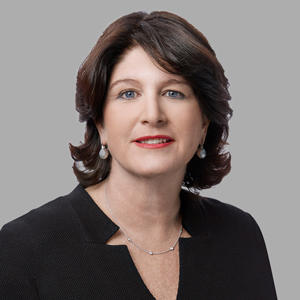
Suzanne Amaducci-Adams, Bilzin Sumberg
“Until we have a steady stream of income from travelers, the hotels are not going to be able to function properly and not be able to meet their obligations,” said Suzanne Amaducci-Adams, a partner and head of real estate at Bilzin Sumberg, a major commercial law firm based in Miami.
“No hotel can operate on less than 20 percent occupancy,” she added. “The numbers don’t work.”
Survival tactics
Dozens of hotels are in a similar situation as the Fontainebleau and tens of thousands of hospitality workers have lost their jobs in South Florida alone.
The Trump Organization, for example, laid off nearly 800 employees in March, including many at the president’s Mar-a-Lago resort and club in Palm Beach. Alan Lieberman’s South Beach Hotel Group and the Loews Hotel each laid off more than 700 employees.
And with air travel, occupancy and room rates still low, the layoffs will likely last longer than originally anticipated.
Occupancy among South Florida’s hotels that haven’t shut down completely exceeded 30 percent during the week of July 4, according to data from the hotel research firm STR. But while that’s an increase from earlier in the pandemic, it marks a 54 percent annual decline.
The average daily rate was $124, a 24 percent drop from the same week last year, and revenue per available room was $42, down 65 percent year over year, per STR.
A majority of hotels secured loan deferments or concessions that were set to expire by July, and a good chunk of the high season was lost to coronavirus. Like most commercial real estate, any hotel sales that were in the pipeline were either canceled or indefinitely placed on hold.
Before the pandemic, 2020 was supposed to be a banner year for South Florida’s hotels — after the market faced setbacks from the Zika outbreak in 2016 and Hurricane Irma in 2017.
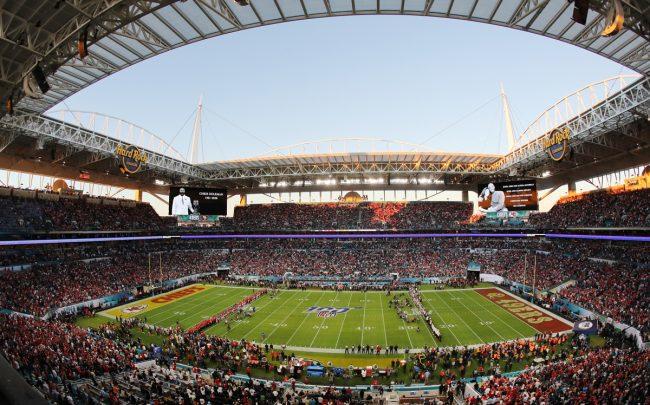
Super Bowl LIV (Getty)
Super Bowl LIV, which Miami hosted in early February, was a boon for local hotels. That weekend, the average daily rate increased almost 150 percent year-over-year, with occupancy rising above 90 percent. Following that, hotels had other events to look forward to: 2020’s Ultra Music Festival in March, the Miami Open in April, and weeks of Spring Break.
“Most hotels were having sort of the best year in five or six years,” said Max Comess, managing director of Hodges Ward Elliott’s Miami office. But all of the big events lined up for the spring were eventually canceled.
Hotel owners and operators typically budget a loss for the slow season, Comess noted, but with the high season cut short, it’s almost impossible to say which hotels will make it through the rest of the year.
“No one knows when the market will really start to bounce back without a vaccine for Covid-19 and a return of consumer confidence in travel,” he added. “Business travel is non-existent, and most Americans are now vacationing in areas they can drive to.”
After being shut down on March 23, Florida’s hotels were allowed to reopen beginning June 1.
But many owners are waiting until August or September to start welcoming guests, while others continue to delay their opening dates due to increased restrictions and low demand.
Among those that are still closed are the Standard Spa Miami Beach, the JW Marriott Marquis Miami, Four Seasons Hotel Miami, the Shore Club, the Gale South Beach, and Novotel Miami Brickell, according to their websites.
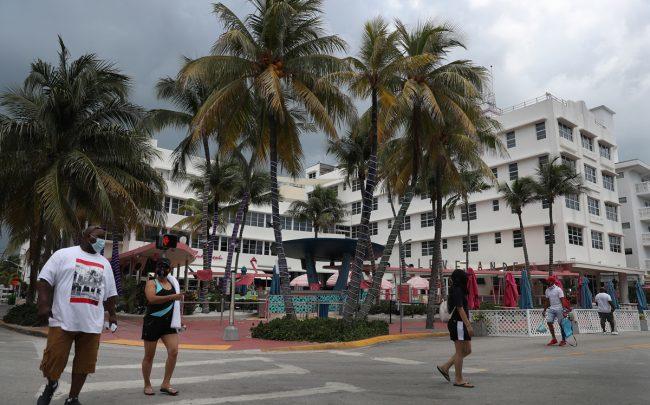
The Clevelander South Beach (Getty)
The Clevelander South Beach, a popular party hotel on Ocean Drive, voluntarily closed its doors in July. A notice posted on its website said it was closed until further notice “due to public health concerns” caused by Covid-19.
“Some hotel owners are opting to stay closed,” Amaducci-Adams said. “Hotel owners have never really been faced with that horrible decision before.”
A deal drought
Some big deals that were in the works prior to the pandemic are also on ice.
Richard Branson’s Virgin Hotels — an offshoot of the billionaire entrepreneur’s Virgin Group — had prepared a 46-page offering package for the Shore Club in South Beach, a self-described “Art Deco labyrinth of gardens and alcoves” on Collins Avenue.

Richard Branson
The hotel group had been searching for a flagship property in Miami Beach for years, and seemed to have found it in the 309-room Shore Club owned by Ziel Feldman’s HFZ Capital Group.
Then the pandemic hit.
Once institutional lenders start saying no, they’re all going to start saying no.
Virgin was seeking to acquire and redevelop the Shore Club for roughly $335 million. The proposal, obtained by The Real Deal, included a purchase price of $235 million and upgrades that would cost an additional $100 million.
HFZ acquired the hotel in late 2013, with plans to redevelop the historic property into luxury condominiums, but canceled plans three years ago and returned buyers’ deposits due to the slow condo market.
Virgin was aiming to close on the property in the first quarter of 2020, break ground a year later, and open as early as August 2022. But the deal has been tabled indefinitely, as the market overall remains on hold.
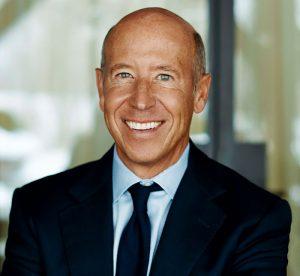
Barry Sternlicht, Starwood Capital Group
What happened with the Shore Club is telling for other significant hotel deals in the works prior to the pandemic, in major cities across the country. Some investors, including Barry Sternlicht’s Starwood Capital Group, are on the hunt for deeply discounted hotels.
“We have a pretty deep background in hotels, and I’m willing to buy cheap real estate in the hotel space because I believe in the asset class,” Sternlihct told TRD in a May interview. “I think I know what we can do with them.”
But Miguel Pinto, president and broker of Apex Capital Realty, said for investors who need access to bank financing, even buying distressed hotel assets could be a challenge.
“Banks, for the most part, don’t want to touch hotels today,” he said. “It’s a big risk for them to have hotels in their portfolio — especially at high loan-to-value ratios.
“Without the lending from banks, hotel transactions tend to be very difficult,” he added.
“Completely frozen”
Lenders are unsure of when the market will return and how to value properties.
International and business travel are non-existent, domestic travel is limited, and the cruise line industry, which feeds hotels, is still shut down.
As a result, hotels are “not exactly the most attractive lending asset class right now,” said J.C. de Ona, president of Centennial Bank’s Southeast Florida division. “How do you underwrite a hotel not knowing when they’re going to get profitable right now?”
And the timeline for a recovery is to be determined. The weekend of July 4th was expected to be a “turning point,” Ona said, but once the beaches were closed, hotel owners saw cancellations left and right.
“Are they going to get back to normal? Yes, but it could take a couple of years,” he noted. “At what point do banks get comfortable that the environment is getting better? That’s the unknown.”
Centennial isn’t actively looking to lend on any hotel deals in South Florida, though de Ona said the bank wouldn’t rule it out entirely — depending on the borrower.
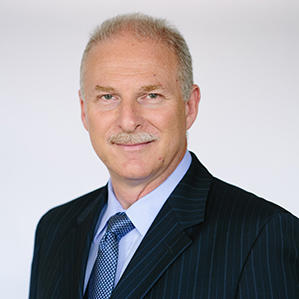
Boaz Ashbel, Aztec Group
Boaz Ashbel, managing director of the Miami-based debt brokerage Aztec Group, said the lending market is “completely frozen.”
“Most lenders right now are evaluating every single hotel loan they have, trying to determine what kind of risk they have and how to eliminate it,” he said.
Just a small handful of non-traditional lenders will offer “very high-priced loans” that are designed to be more like bridge and short-term loans “to buy enough time to allow a borrower to get over the pandemic,” Ashbel added.
Most loan agreements include a measuring point to ensure hotels are producing enough income to cover the debt service, said attorney Luis Flores of the law firm Saul Ewing Arnstein & Lehr.
If properties are barely covering their mortgage payments, it could trigger a higher interest rate. Lenders could start to foreclose if the hotel isn’t generating enough money.
“At some point, that breathing room is going to expire and the water is going to boil over,” Flores added. “Once institutional lenders start saying no, they’re all going to start saying no. It will be like a brush fire, it will start to spread very quickly.”
Desperate times
Borrowers with securitized commercial mortgages will likely be the first to default, according to several industry sources.
CMBS loans are typically hardest to renegotiate and hotels dependent on large groups and conventions could take the largest time to recover, Ashbel said.
That could be especially true for Soffer’s Fontainebleau, the largest hotel in Miami-Dade, known for hosting conventions and star-studded concerts.
Typically, about 50 percent of the Fontainebleau’s business comes from group bookings and conventions; leisure travelers take up the other half.
And the hotel’s nearly $1 billion CMBS loan is the largest to go into special servicing in South Florida. Though special servicing is usually triggered by two missed payments, the hotel is on up to speed on its debt service, according to Trepp.
“We’re still working through [loan] modifications,” Brett Mufson, president of Fontainebleau Development, told TRD in July. “We remain in compliance and are not in default.”
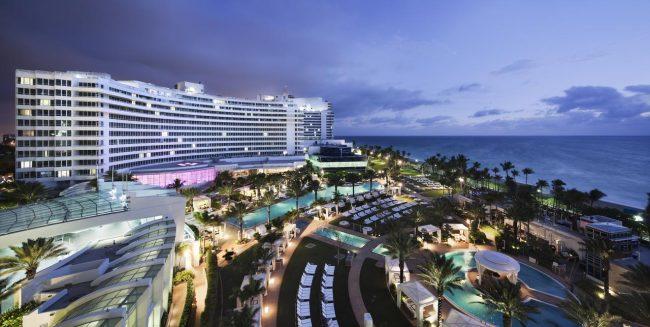
The Fontainebleau Miami Beach
There’s a big gap between Fontainebleau’s loan and the next CMBS loan on a South Florida hotel to go into special servicing: the nearly $114 million mortgage backing the Grand Beach Hotel.
The top five CMBS hotel loans in special servicing, per Trepp, are for a variety of properties throughout Miami-Dade, Broward and Palm Beach counties, and no hotel owner is immune, industry sources say.
Real estate investment banking firm Lotus Capital Partners, led by founder and CEO Faisal Ashraf, is working on behalf of hotel borrowers on debt restructurings with lenders. That includes reallocating furniture, fixtures, and equipment reserves to make their debt payments and arranging forbearance agreements, Ashraf said.
“Large hotels will be very slow to come out of the gate or be fundamentally changed forever,” Ashraf said. “I think the second round of forbearances is when the claws come out and it could coincide with the lifting of all of these moratoriums.”
Once lender concessions run out, many hotel owners will be forced to spend more of their own capital, sell their debt, or sell their properties.
Most owners aren’t yet desperate, but some “will be forced to make decisions based on their liquidity situation,” said Scott Berman, a principal at PricewaterhouseCoopers, who leads the hospitality and leisure practice for the firm.
“Cash is king and liquidity is essential,” Berman added.
Publicly, many owners have been holding firm, expressing confidence that the market will bounce back in a matter of time. But, behind closed doors, some are also sizing up their options should that take longer than they hope.
“We have knowledge of many hotels [where] the owners want out,” said Pinto of Apex Capital. “You won’t see them hit the market for now, but we are getting calls from the owners to bring them offers. They want out.”
Correction: An earlier version of this story misrepresented Lotus Capital Partners’ role in debt restructurings.
